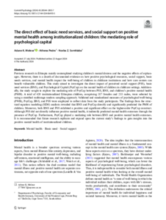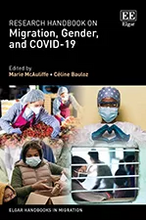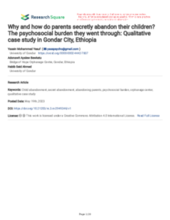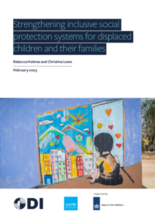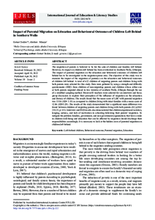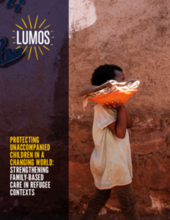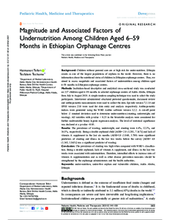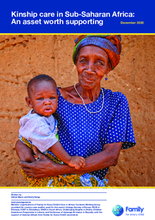childrens_living_arrangement
children_living_without_bio
Displaying 1 - 10 of 70
This study aimed to investigate the direct impact of perceived social support, basic need services, and Psychological Capital on the mental health of children in childcare settings in Ethiopia.
This chapter is part of the "Research Handbook on Migration, Gender, and COVID-19" and explores the gender and youth dimensions of return from GCC States to the East Africa subregion, focusing on three countries: Uganda, Kenya and Ethiopia.
This paper assesses the legal regime governing inter-country adoption under the Ethiopian family laws by making a brief comparative study with correspondent provisions of the Chinese family law.
This study explored the lived experiences of mothers/fathers who secretly abandoned their children in Ethiopia.
Authored by the ODI in partnership with UNICEF, this paper assesses the benefits of inclusive social protection from a displacement and child-centred perspective.
The migration of parents is believed to be for the sake of children and families left behind. However, its impact on children left behind has been overlooked in Southern Wollo, Ethioipia. The impact of parental migration on the education and behavioral outcomes of children left behind has to be investigated in the migration-prone area. The objective of this study was to examine the impact of the migration of parent(s) on the education and behavioral outcomes of children left behind.
Through interviews with adoptive parents, this study explores what and how adoption-related exploitation occurred in Ethiopia.
Lumos worked together with partners on the family-based care for unaccompanied children project between 2018 and 2020, in four camps in the Tigray region of Ethiopia. This evaluation report considers the various components of the project and provides recommendations to child protection and refugee response practitioners, with the aim of improving the quality of child protection programming and its impact on unaccompanied children in refugee contexts.
This study aimed to assess magnitude and associated factors of undernutrition among children aged 6–59 months in Ethiopian orphanage centres.
This paper argues that kinship care – the care of children by relatives or friends of the family – represents the greatest resource available for meeting the needs of girls and boys who are orphaned or otherwise live apart from their parents.

